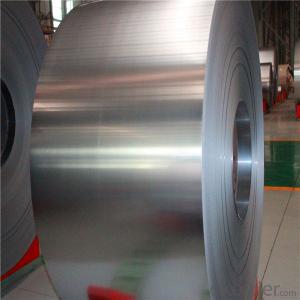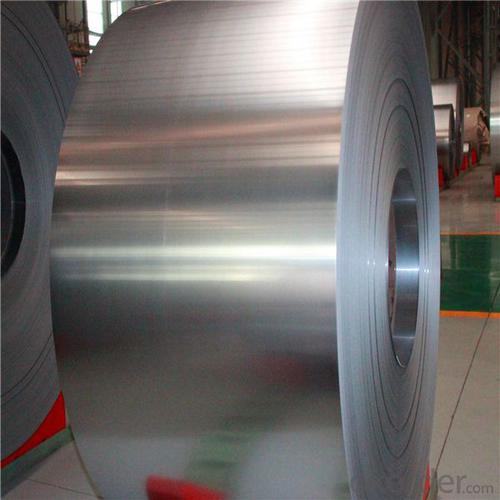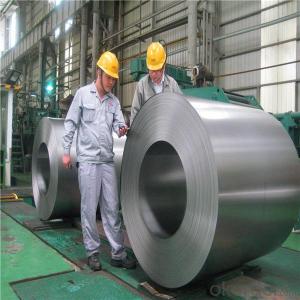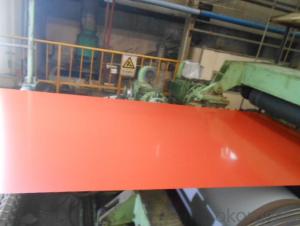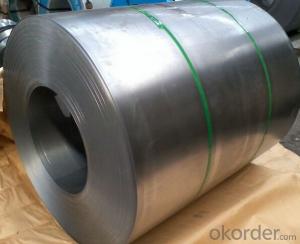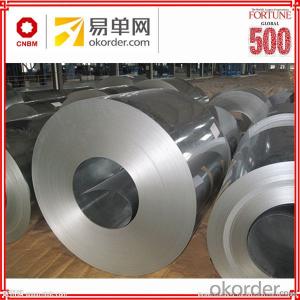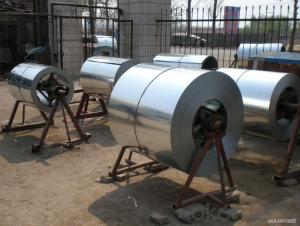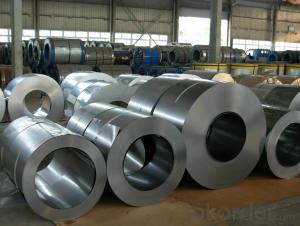Cold Rolled Steel Coils/China Supplier Made in China
- Loading Port:
- China main port
- Payment Terms:
- TT OR LC
- Min Order Qty:
- 20 m.t.
- Supply Capability:
- 50000 m.t./month
OKorder Service Pledge
OKorder Financial Service
You Might Also Like
Specification
Prime Quality SPCC Cold Rolled Steel Sheet/Coil
Widely used to appliance,automobile industry or other decoration usage.
Certificate: ISO9001
Packing Details: Wrapped by water proof paper and plastic film.Covered with iron sheet,strapped by steel strips to protect the damage under transportation.
Details please check following format
Brief Introduction
Cold rolled steel coil is steel that has been worked below its recrystallization temperature by passing it between a pair of rollers. Recrystallization temperature is the temperature at which grains in the lattice structure of the metal have been rearranged, leaving it free of strain and deformations. Cold rolled steel coil is pre-treated before being cold rolled with a process known as pickling, which uses strong acids to remove scale and other impurities. The cold rolled steel coil is then passed through rollers to reduce its thickness. Most cold rolling takes place in multiple passes and as the size of the cold rolled steel coil is further reduced, its strength and hardness both increase, but its ductility decreases. After cold rolling, heating the metal up in a process known as annealing can restore some of its ductility. The final cold rolled steel coil may be manufactured in the form of sheets, strips, bars, or other forms.
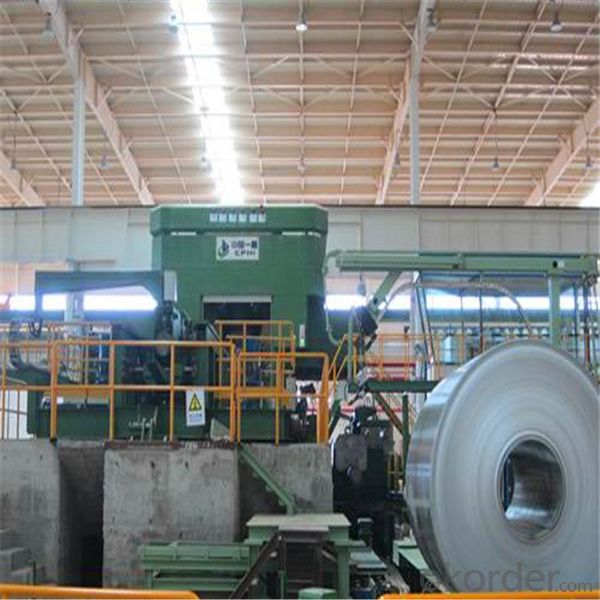
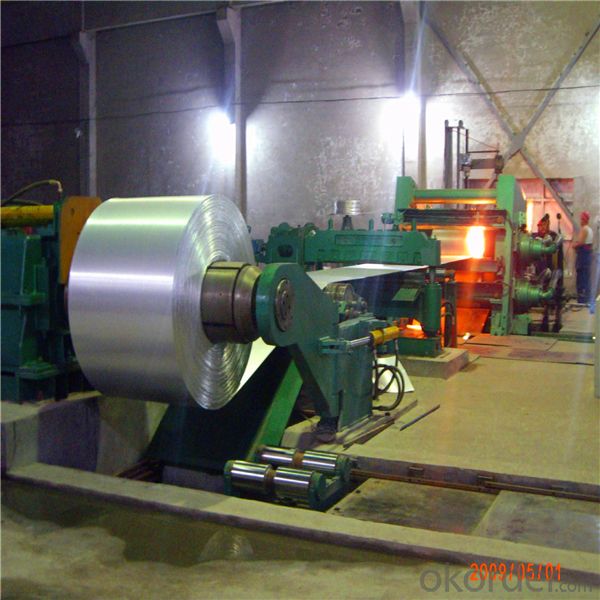
Mechanical Properties
1. Yield Strength: ≤320MPa
2. Tensile Strength: ≤370MPa
3. Elongation (L=50mm, b=25mm) When:
(1) Nominal Thickness<0.25mm: 30%
(2) Nominal Thickness 0.25mm-<0.40: 32%
(3) Nominal Thickness 0.40-<0.60mm: 34%
(4) Nominal Thickness 0.60-<1.0mm: 36%
(5) Nominal Thickness 1.0-<1.6mm: 37%
(6) Nominal Thickness >1.6mm: 38%
FAQ:
1. Q: Where is your company located? How can I visit there?
A: Our company is located in Beijing, China. Welcome to visit us.
2. Q: Can I get sample and how long will it take?
A:Yes. We can supply sample. And you need to pay for courier.
3. Q: What's the MOQ?
A: Our MOQ is 25mt.
4. Q: What's the delivery time?
A: It will take about 30 days after TT or L/C.
5. Q: What is the payment terms?
A: T/T, L/C at sight
6. Q: How does your factory carry out quality control?
A: We attach great importance to quality control.Every part of our products has its own QC.
7. Q: What certificate do you have?
A: We have SGS, ISO9001 etc.
- Q: How are steel coils used in the manufacturing of storage tanks?
- Steel coils are used in the manufacturing of storage tanks as they serve as the primary material for constructing the tank shell. The coils are processed and shaped into cylindrical sections, which are then welded together to form the tank. This ensures strength, durability, and leak-proof construction, making steel coils an essential component in the fabrication process of storage tanks.
- Q: Where do I need hot galvanized steel coils and color coated rolls?
- In industrial or coastal areas, due to the influence of sulphur dioxide or salt in the air, the corrosion rate is accelerated and the service life is affected. In the rainy season, the coating has been soaked by rain for a long time, or the temperature is too large and easy to dew. It will be corroded quickly and the service life will be reduced. A building or building made of colored coated steel plates, often with a long service life when washed by rainwater, otherwise affected by sulfur dioxide, gas, salt, and dust. Therefore, in the design, if the roof slope is greater, the more difficult to accumulate dust and other dirt, the longer the service life; for those areas or parts that are not often washed by rain water, should be regularly washed with water.
- Q: When i was 15 i got caught steeling at Super A yes i know i cant believe it. They didnt call the cops or anything they released me to my aunt they took my name and adress and everythimg they said it wouldnt be on my record. But I'm not so sure. Will it be on my record if they didn't call the cops?i live in california. Is there any way i can check my record?
- Steeling? What's that? Did you take a piece of steel and weld it? I am confused?
- Q: What are the challenges faced during steel coil processing?
- Steel coil processing presents several challenges that can be encountered. One of the primary obstacles involves the proper handling of the heavy steel coils, which can weigh several tons. It is crucial to have the correct equipment and procedures in place to safely move and manipulate the coils. This necessitates the use of cranes, forklifts, or other strong lifting devices capable of handling the weight and size of the coils. Another challenge revolves around maintaining the integrity of the steel coils throughout the processing. These coils are vulnerable to damage from scratches, dents, or other physical deformations. To minimize the risk of damage, it is important to establish suitable storage and handling procedures. Moreover, caution must be exercised during cutting, slitting, or other processing operations to prevent any harm or compromise to the coils. Quality control presents another significant challenge in steel coil processing. Consistently producing coils that meet the required specifications, such as thickness, width, and surface quality, is essential. To achieve this, meticulous inspection and monitoring must be carried out throughout the entire processing chain, from the receipt of raw materials to the final product. Any deviations from the desired specifications can result in rejected coils or customer dissatisfaction. Efficiency and productivity also pose challenges in steel coil processing. It is imperative to optimize processing operations to minimize waste, reduce downtime, and maximize throughput. This can be achieved through the implementation of automation, improved production planning, and streamlined workflows. Additionally, striking a balance between production speed and maintaining quality standards is crucial for efficient and productive processing. Lastly, safety is a significant challenge in steel coil processing. The equipment and processes involved in the industry present various risks to workers, including accidents, injuries, or exposure to harmful substances. To ensure a safe working environment, it is vital to establish proper safety protocols, provide adequate employee training, and regularly inspect and maintain equipment. In conclusion, steel coil processing encompasses challenges such as handling heavy coils, maintaining their integrity, ensuring quality control, optimizing efficiency and productivity, and ensuring a safe working environment. By addressing these challenges, steel coil processors can achieve smooth operations and deliver high-quality products to their customers.
- Q: How do steel coils compare to aluminum coils?
- Steel coils are generally stronger and more durable than aluminum coils. They have a higher tensile strength and better resistance to impact and abrasion. However, aluminum coils are lighter, more corrosion-resistant, and have better thermal conductivity. The choice between steel and aluminum coils depends on the specific application and the desired characteristics such as strength, weight, and corrosion resistance.
- Q: What are the different coating options for steel coils?
- There are several coating options available for steel coils, each serving different purposes and providing unique benefits. Some of the commonly used coating options for steel coils include: 1. Galvanized Coating: This coating involves immersing the steel coils in a bath of molten zinc, creating a layer of zinc on the surface. Galvanized coating provides excellent corrosion resistance and protects the steel from rusting. It is commonly used in applications where the steel coils are exposed to harsh environments or moisture. 2. Galvannealed Coating: This coating is a combination of galvanizing and annealing processes. The steel coils are first galvanized and then annealed to create a layer of zinc-iron alloy on the surface. Galvannealed coating offers enhanced paintability and weldability while providing good corrosion resistance. 3. Aluminum-Zinc Alloy Coating: Also known as Galvalume, this coating consists of an aluminum-zinc alloy applied to the steel coils. It provides excellent corrosion resistance and heat reflectivity, making it suitable for various applications, including roofing, siding, and automotive parts. 4. Organic Coatings: These coatings are typically applied as a top layer over a base coat of galvanized or galvannealed coating. Organic coatings can be in the form of paints, lacquers, or powder coatings. They provide additional protection against corrosion, UV rays, and abrasion, while also enhancing the aesthetics of the steel coils. 5. Chromate Conversion Coating: This coating is primarily used as a pre-treatment before applying organic coatings. It helps improve adhesion between the steel surface and the organic coating, ensuring better corrosion resistance. The choice of coating depends on various factors such as the intended application, environmental conditions, desired appearance, and budget. Manufacturers and end-users should carefully consider these factors to select the most suitable coating option for their specific requirements.
- Q: is red steel any good??????? not sure im really impressed but im not really into fighting games but it looks cool.... so whats your views guys???????anyone bored of smooth moves yet?anyone think the new sonic is bit cra ppy !!!!!!!!!!! darn them any new goooood games coming oput on the wii??
- Have you tried Zelda or Trauma Center? Those should give you a good ride for your money. If you have a few bucks lying around pick either of them up.
- Q: How are steel coils used in the production of wind turbines?
- Steel coils are used in the production of wind turbines to manufacture the tower, nacelle, and other structural components. The coils are processed and shaped into various parts, ensuring the turbines have a sturdy and durable construction. Additionally, steel coils are employed in the manufacturing of the turbine blades, providing strength and reliability to withstand the forces of wind.
- Q: I know that carbon steels and alloy steels are different but are carbon steels still alloys?Thanks!
- Carbon steel, or plain-carbon steel, is a metal alloy. It is a combination of two elements, iron and carbon. Depending upon the amount of presence of carbon in the alloy, Carbon steel can be classified into 4 different categories- Low Carbon Steel Medium Carbon Steel High Carbon Steel Very High Carbon Steel
- Q: Are steel coils used in the oil and gas industry?
- Yes, steel coils are commonly used in the oil and gas industry for various applications. They are utilized in the manufacturing of pipelines, storage tanks, and other equipment due to their strength, durability, and resistance to corrosion. Steel coils are also employed in the construction of offshore platforms and drilling rigs, where they provide structural support and ensure the safety and reliability of the infrastructure.
Send your message to us
Cold Rolled Steel Coils/China Supplier Made in China
- Loading Port:
- China main port
- Payment Terms:
- TT OR LC
- Min Order Qty:
- 20 m.t.
- Supply Capability:
- 50000 m.t./month
OKorder Service Pledge
OKorder Financial Service
Similar products
Hot products
Hot Searches
Related keywords
